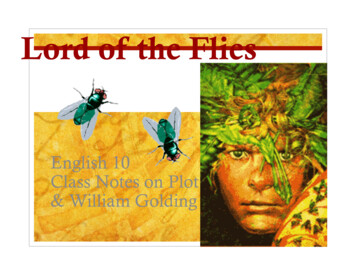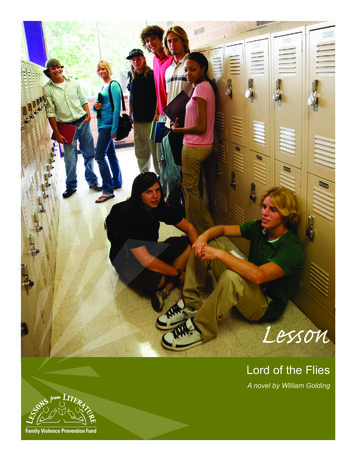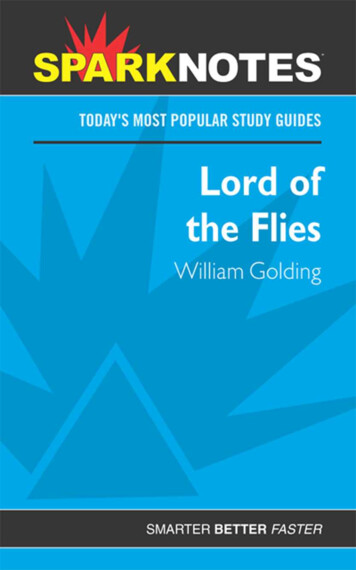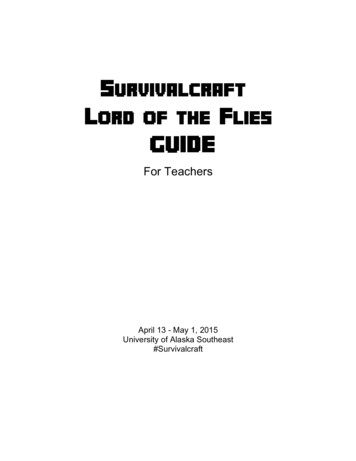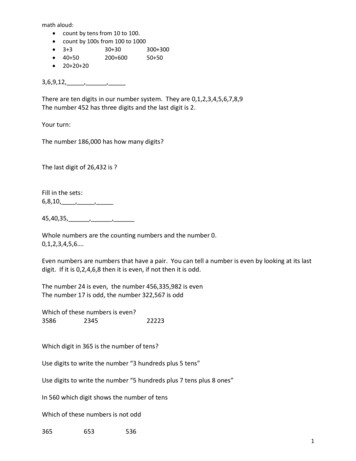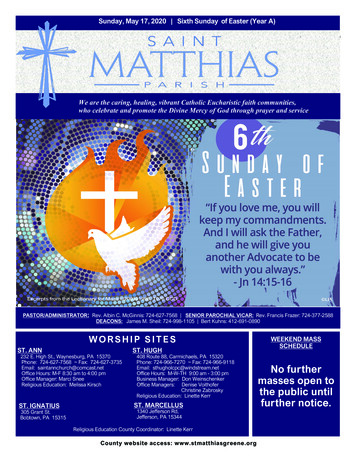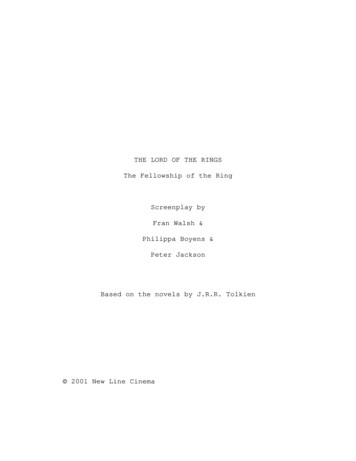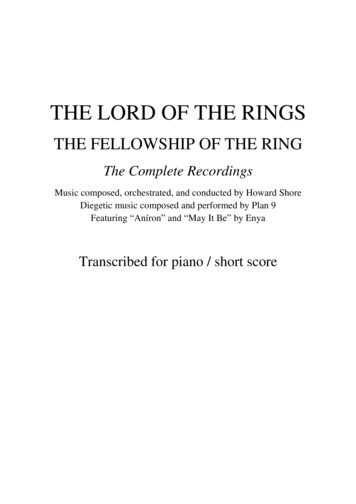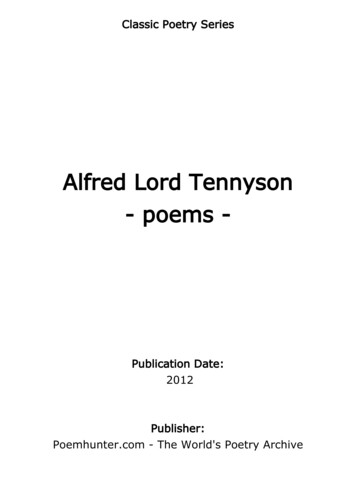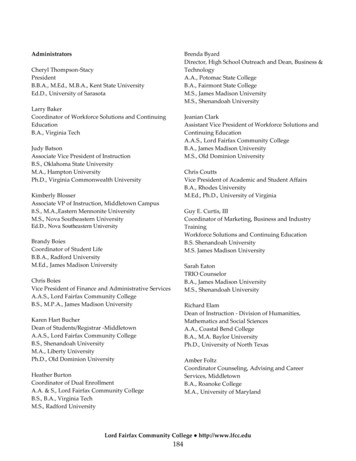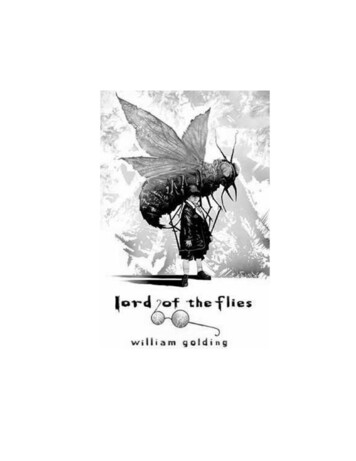
Transcription
Ac k n owle d gme ntsA casebook edition of any work of literature is necessarily theresult of work and good will by numerous people. We are deeplyindebted to the writers who contributed the original materialscontained in this volume.We also wish to thank the authors, editors, and publishers whoso kindly granted permissions for use of the previously publishedmaterials collected in this volume. Full acknowledgment for theirvaluable aid is printed in the headnote for each of the articles as wellas original sources of publication.The editors gratefully acknowledge the special courtesies ofWilliam Golding, J. T. C.Golding, Frank Kermode, Donald R.Spangler, Bruce P. Woodford, A. C. Willers and James Keating.The Introduction to this book originally appeared in the ArizonaQuarterly. It is reprinted here (revised) by permission of the editor,Albert F. Gegenheimer.For her expert aid in preparing the manuscript, our thanks to Mrs.Paul V. Anderson, and our special gratitude to Miss Helen Davidson,who not only performed routine secretarial duties but offered adviceand kept spirits buoyant with her penetrating wit.J.R.B.A.P.Z., Jr.
ForewordARTHUR P. ZIEGLER, JR.It is most astonishing and lamentable that a book as widely readand frequently used in the classroom as William Gelding's Lord ofthe Flies has received so little analytical attention from the critics.True, it has not been neglected; this volume attests to that. Butdespite the profusion of essays by a number of well-known andworthy critics, few close analyses of Golding's technique can befound among them, few explications of the workings of the novel willbe discovered.Indeed, despite a running controversy over the meaning of thenovel, critical articles fall largely into a pattern of plot summaryand applause for the arrangement of the novel's materials followedby observations on Golding's view of human nature, oftenembellished with the critic's response to that view.There are exceptions — they will be found among the essays inthis book — like Claire Rosenfield's psychological study of meaning,Carl Niemeyer'scomparativestudyofthenovel anditsantipathetic predecessor The Coral Island, Donald R. Spangler'spenetrating study of the function of Simon, and William Mueller'sdiscussion of the use of the various hunts.Further explorations are needed in many areas, however, amongthem a careful scrutiny of the opening descriptions of Ralph and Jackin Chapter One. It is useful, but perhaps not very subtle, to point outthat the former is immediately declared the "fair boy," that he, like theangel Gabriel, sounds a horn that announces good news — that ofsurvival — that Jack with his angular frame, black cloak and cap, andred hair is Lucifer-like.
More Biblical parallels must be developed — the paradisiacalsetting, the symbolic nakedness or near nakedness of all the boysexcept Jack and his followers — but most especially needed is astudy that explains items that do not comply with the originalBiblical pattern but that perhaps serve a s tip-offs to the themeand the ironies that Golding employs without fully delineating untilthe last page, for instance the "response" of the paradise to theboys— first from the heat, then a bird with an echoed "witch-like cry,"then the entangling creepers (more like the Eden of Milton thanGenesis)—together with the important information that Ralph, notJack, has a snake-clasp belt, that Jack wears a golden badge. Wehave implications very early that Golding's view is not simple,traditionally Christian, or predictable in spite of the title, that it is acomplex rebuttal to the ever-present faith in man's potential forregeneration and redemption. Here is a fruitful area of research:do all these elements of the novel, some seemingly inconsistent,even extraneous, operate in unified support of theme?Symbolism is one of the most puzzling aspects of this book.The names of the four major characters are a perplexingillustration. Simon, the mystic of the group, has a name clearly linkedwith an Apostle of Christ, the one, strange to say, who denied Himthree times. (Simon does deny the objective existence of the beast,but is this a parallel?) Jack also has such a name, since his firstname is a nickname for John, the announcer of Christ, also afollower of Christ, arid his last name is Merridew, an echo at leastof Mary. Ralph's name, oddly enough, is unrelated to the NewTestament and in fact is said to be akin to the Anglo-SaxonRaedwulf, "wolf-council." Piggy's nickname appears even more
incongruous because it is Simon rather than Piggy who is slain as asubstitute pig. The only instance in which a name seemsincontestably appropriate is that of Roger, where etymology directs usto the Anglo-Saxon Hrothgar, "spear-fame."In The Coral Island the three protagonists are named Jack,Ralph, and Peterkin Gay. Golding claims that he changed the lattername to Simon to emphasize his priestly qualities —implying someintention on his part to make at least one name symbolic—while anothercritic insists that Peterkin is altered not to Simon but to Piggy. Butthat is beside the point. The central question is, "To what extent dothe names function symbolically?" Do we just select Simon andRoger and, because inconvenient, forget the others? Or is thereanother more subtle solution?We are also mystified by the relationship between Lord of theFlies and The Coral Island. Before undertaking a study of Golding'sbook, must one study Ballantyne's? To what degree do details inthe former depend upon the latter, and, more confusing, to whatdegree do both books contain the same details because of similarityof setting?No one has produced a full-scale synthesis of the symbols of thenovel either, nor has anyone prepared a fully adequate study ofcharacterization. Ralph himself is an enigma. Does he represent theidealist and Piggy the pragmatist? Or the reverse? Why are Piggyand Jack foes from the start, but Ralph and Jack friends for aconsiderable length of time? Is it important that Ralph disdains Piggyfor so long? Why does Ralph the leader have such difficultiescontrolling the littluns even though they instantly recognize him aschief rather than Jack? Why doesn't Ralph establish a closer bond
with Simon? Why does Golding-have Ralph enjoy drawing blood?As one examines the novel closely, he may find himself confrontedwith a highly ambiguous protagonist, and for what purpose? Dothese complications help or hinder the operation of the novel? Theseare vital matters in evaluating it.One could add to this list of needed studies indefinitely: adetailed look at the use of war and fighting (they are important fromthe first page to the last), a discussion of the relationship of naturedescriptions and events, a look at the historical predecessors ofthe mountain, and how they bear on the novel (Calvary, Sinai,Ararat, Olympus, to name a few possibilities), the cause of the evil (Isit really "original sin"?), and so on.Yet in spite of the gaps in the criticism, some commendablestudies have been undertaken, and we have tried to assemble themost useful of them in this book. Supplementing them are twointerviews with Golding in which he discusses both his ownconception of the novel and related matters.Through our arrangement of and notes to the articles, we havetried to reflect the intricate texture of the novel as illustrated by thecritics and to point up areas of perplexity and disagreement. Thebibliography at the close of the volume indicates possibilities forfurther reading and study.
I n t r o d u c t ionJAMES R. BAKERLord of the Flies offers a variation upon the ever-popular taleof island adventure, and it holds all of the excitements common tothat long tradition. Golding's castaways are faced with the usualstruggle for survival, the terrors of isolation, and a desperate outfinally successful effort to signal a passing ship which will returnthem to the world they have lost. This time, however, the story istold against the background of an atomic war. A plane carrying someEnglish boys, aged six to twelve, from the center of conflict is shotdown by the enemy and the youths are left without adult company onan unpopulated Pacific island. The environment in which they findthemselves actually presents no serious challenge: the island is aparadise of flowers and fruit, fresh water flows from the mountain,and the climate is gentle. In spite of these unusual naturaladvantages, the children fail miserably and the adventure ends in areversal of their (and the reader's) expectations. Within a short timethe rule of reason is overthrown and the survivors regress tosavagery.During the first days on the island there is little forewarning ofthis eventual collapse of order. The boys are delighted with theprospect of some real fun before the adults come to fetch them.With innocent enthusiasm they recall the storybook romances theyhave read and now expect to enjoy in reality. Among these is TheCoral Island, Robert Michael Ballantyne's heavily moralistic idyll ofcastaway boys, written in 1858 yet still, in our atomic age, a popularadolescent classic in England. In Ballantyne's tale everything comesoff in exemplary style. For Ralph, Jack, and Peterkin (his charming
young imperialists), mastery of the natural environment is anelementary exercise in Anglo-Saxon ingenuity. The fierce pirateswho invade the island are defeated by sheer moral force, and thetribe of cannibalistic savages is easily converted and reformed by theexample of Christian conduct afforded them. The Cord Island is againmentioned by the naval officer who comes to rescue Golding's boysfrom the nightmare they have created, and so the adventure ofthese enfants terribles is ironically juxtaposed with the spectacularsuccess of the Victorian darlings. The effect is to hold before us tworadically different pictures of human nature and society. Ballantyne,no less than Golding, is a fabulistwho asks us to believe that theevolution of affairs on his coral island models or reflects the adultworld, a world in which men are unfailingly reasonable, cooperative,loving and lovable. We are hardly prepared to accept these optimisticexaggerations, though Ballantyne's story suggests essentially thesame flattering image of civilized man found in so many familiarisland fables. In choosing to parody and invert this image Goldingposits a reality the tradition has generally denied.The character of this reality is to be seen in the final episode ofLord of the Flies. When the cruiser appears offshore, the boy Ralph isthe one remaining advocate of reason, but he has no more statusthan the wild pigs of the forest and is being hunted down for the kill.Shocked by their filth, their disorder, and the revelation that therehave been real casualties, the officer (with appropriate fatherlyindignation) expresses his disappointment in this "pack of Britishboys." There is no basis for his surprise, for life on the island hasonly imitated the larger tragedy in which the adults of the outsideworld attempted to govern themselves reasonably but ended in the
same game of hunt and kill. Thus, according to Golding, the aim ofthe narrative is "to trace the defects of society back to the defects ofhuman nature"; the moral illustrated is that "the shape of societymust depend on the ethical nature of the individual and not on anypolitical system however apparently logical or respectable." Andsince the lost children are the inheritors of the same defects ofnature which doomed their fathers, the tragedy on the island isbound to repeat the actual pattern of human history.The central fact in that pattern is one which we, like the fatuousnaval officer, are virtually incapable of perceiving: first, because it isone that constitutes an affront to our ego; second, because itcontroverts the carefully and elaborately rationalized record ofhistory which sustains the ego of "rational" man. The fact is thatregardless of the intelligence we possess—an intelligence whichdrives us in a tireless effort to impose an order upon our affairs—wearedefeatedwithmonotonousregularity by our ownirrationality. "History," said Joyce's Dedalus, isa nightmarefromwhichIamtryingtoawake." But we do not awake. Though weconstantly make a heroic attempt to rise to a level ethically superiorto nature, our own nature, again and again we suffer a fall—broughtlow by some outburst of madness because of the limiting defectsinherent in our species.If there is any literary precedent for the image of man containedin Gelding's fable, it is obviously not to be found within the frameworkof a tradition that embraces Robinson Crusoe and Swiss FamilyRobinsonand includes also those island episodes in Conrad'snovels in which the self-defeating skepticism of a Heyst or aDecoud serves only to illustrate the value of illusions. All of these
offer some version of the rationalist orthodoxy we so readily accept,even though the text may not be so boldly simple as Ballantyne'ssermon for innocent Victorians. Quite removed from this tradition,which Golding invariably satirizes, is the directly acknowledgedinfluence of classical Creek literature. Within this designation, thoughGolding's critics have ignored it, is an obvious admiration forEuripides. Among the plays of Euripides it is, The Bacchae thatGolding, like Mamillius of The Brass Butterfly, knows by heart Thetragedy is a bitter allegory on the degeneration of society, and itcontains the basic parable which informs so much of Golding's work.Most of all, Lord of the Flies, for here the point of view is similar to thatof the aging Euripides after he was driven into exile from Athens.Before his departure the tragedian brought down upon himself themockery and disfavor of a mediocre regime like the one which latercondemned Socrates. The Bacchae, however, is more than anexpression of disillusionment with the failing democracy. Its aim isprecisely what Golding has declared to be his own: "to trace thedefects of society back to the defects ofhuman nature," and soaccount for the failure of reason and the inevitable, blind ritual-hunt inwhich we seek to kill the "beast" within our own being.The Bacchae is based on a legend of Dionysus wherein the god(a son of Zeus and the mortal Semele, daughter of Cadmus)descends upon Thebes in great wrath, determined to takerevenge upon the young king, Pentheus, who has denied himrecognition and prohibited his worship. Dionysus wins asdevotees the daughters of Cadmus and through his power ofenchantment decrees that Agave, mother of Pentheus, shall lead theband in frenzied celebrations. Pentheus bluntly opposes the god and
tries by every means to preserve order against the rising tide ofmadness in his kingdom. The folly of his proud resistance' isshown in the defeat of all that Pentheus represents: thebacchantes trample on his edicts and in wild marches through theland wreck everything in their path. Thus prepared for hisvengeance, Dionysus casts a spell over Pentheus. With hisjudgment weakened and his identity obscured in the dress of awoman, the defeated prince sets out to spy upon the orgies. In theexcitement of their rituals the bacchantes live in illusion, and all thatfalls in their way undergoes a metamorphosis which brings it intoaccord with the natural images of their worship. When Pentheus isseen he is taken for a lion and, led by Agave, the blind victims of thegod tear him limb from limb. The final humiliation of those who denythe godhead is to render them conscious of their crimes and to castthem out from their homeland as guilt-stricken exiles and wanderersupon the earth.For most modern readers the chief obstacle in the way of properunderstanding of The Bacchae, and therefore Golding's use of it, isthe popular notion that Dionysus is nothing more than a charminggod of wine. This image descends from "the Alexandrines, andabove all the Romans—with their tidy functionalism and hodepartmentalized Dionysus as 'jolly Bacchus' with his riotouscrew of nymphs and satyrs. As such he was taken over from theRomans by Renaissance painters and poets; and it was they inturn who shaped the image in which the modern world pictureshim." In reality the god was more important and "much moredangerous": he was "the principle of animal life the hunted and
the hunter—the unrestrained potency which man envies in thebeasts and seeks to assimilate." Thus the intention and chief effect ofthe bacchanal was "to liberate the instinctive life in man from thebondage imposed upon it by reason and social custom. ." In hisplay Euripides also suggests "a further effect, a merging of theindividual consciousness in a group consciousness' so that theparticipant is "at one not only with the Master of Life but his fellowworshipers and with the life of the earth."Dionysus wasworshiped in various animal incarnations (snake, bull, lion, boar),whatever form was appropriate to place; and all of these wereincarnations of the impulses he evoked in his worshipers. In TheBacchae a leader of the bacchanal summons him with theincantation, "O God, Beast, Mystery, come!"Agave's attack uponthe lion" (her own son) conforms to the codes of Dionysic ritual: likeother gods, this one is slain and devoured, his devotees sustained byhis flesh and blood. The terrible error of the bacchantes is apunishment brought upon the land by the lord of beasts: “To resistDionysus is to repress the elemental in one's own nature; thepunishment is the sudden collapse of the inward dykes when theelemental breaks through perforce and civilization vanishes."This same humiliation falls upon the innocents of Lord of the Flies.In their childish pride they attempt to impose an order or pattern uponthe vital chaos of their own nature, and so they commit the errorand "sin" of Pentheus, the "man of many sorrows." The penalties,as in the play, are bloodshed, guilt, utter defeat of reason. Finally,they stand before the officer, "a semicircle of little boys, their bodiesstreaked with colored clay, sharp sticks in their hands."Facing thatpurblind commander (with his revolver and peaked cap), Ralph cries
"for the end of innocence, the darkness of man's heart" (186-87); andthe tribe of vicious hunters joins him in spontaneous choral lamentBut even Ralph could not trace the arc of their descent, could notexplain why it's no go, why things are as they are; for in the courseof events he was at times among the hunters, one of them, and hegrieves in part for the appalling ambiguities he has discovered in hisown nature. He remembers those strange, interims of blindness anddespair when a "shutter" clicked down over his mind and left himat the mercy of his own dark heart. In Ralph's experience, then, theessence of the fable is spelled out: he suffers the dialectic we mustall endure, and his failure to resolve it as we would wishdemonstrates the limitations which have always plagued the species.In the first hours on the island Ralph sports untroubled in thetwilight of childhood and innocence, but after he sounds the conchhe must confront the forces he has summoned to the granite platformbeside the sunny lagoon. During that first assembly he seems toarbitrate with the grace of a young god (his natural bearing isdignified, princely) and, for the time being, a balance is maintained.The difficulties begin with the dream-revelation of the childdistinguished by the birthmark. The boy tells of a snakelike monsterprowling the woods by night, and at this moment the seed of fear isplanted. Out of it will grow the mythic beast destined to become lordof the island. Rumors of his presence grow. There is a plague ofhaunting dreams—the first symptom of the irrational fear which is"mankind's essential illness."In the chapter called "Beast from Water" the parliamentarydebate becomes a blatant allegory in which each spokesmancaricatures the position he defends. Piggy (the voice of reason)
leads with the statement that life is scientific," adds the usualUtopian promises ("when the war's over they'll be traveling to Marsand back"), and his assurance that such things will come to pass ifonly we control the senseless conflicts that impede progress. He ismet with laughter and jeers (the crude multitude), and at thisjuncture a littlun interrupts to declare that the beast (ubiquitousevil) comes out of the sea. Maurice interjects to voice the doubtwhich curses them all: "I don't believe in the beast of course. AsPiggy says, life's scientific, but we don't know, do we? Not certainly. . ." (81). Then Simon (the inarticulate seer) rises to utter the truth ingarbled, ineffective phrases: there is a beast, but "it's only us." Asalways, his saving words are misunderstood, and the prophet shrinksaway in confusion. Amid speculation that he means some kind ofghost, there is a silent show of hands for ghosts as Piggy breaks inwith angry rhetorical questions: "What are we? Humans? Oranimals? Or savages?" (84). Taking his cue, Jack (savagery inexcelsis) leaps to his feet and leads all but the "three blind mice"(Ralph, Piggy, Simon) into a mad jig of release down the darkeningbeach. The parliamentarians naively contrast their failure with thesupposed efficiency of adults, and Ralph, in despair,asksforasignfrom that ruined world.In "Beast from Air" the sign, a dead man in a parachute, is sentdown from the grownups, and the collapse foreshadowed in theallegorical parliament comes on with surprising speed. Ralphhimself looks into the face of the enthroned tyrant on the mountain,and from that moment his young intelligence is crippled by fear.He confirms the reality of the beast and his confession ofweakness insures Jack's spectacular rise to power. Yet the ease with
which Jack establishes his Dionysian order is hardly unaccountable.In its very first appearance the black-caped choir, vaguely evil inits military esprit, emerged ominously from a mirage and marcheddown upon the minority forces assembled on the platform. Except forSimon, pressed into service and out of step with the commonrhythm, the choir is composed of servitors bound by the ritual andmystery of group consciousness. They share in that communion,and there is no real "conversion" or transfer of allegiance from goodto evil when the chorus, ostensibly Christian, becomes the tribe ofhunters. The lord they serve inhabits their own being. If they turnwith relief from the burdens of the platform, it is because they cannottranscend the limitations of their own nature. Even the parliamentarypool of intelligence must fail in the attempt to explain all thatmanifests itself in our turbulent hearts, and the assertion that life isordered, "scientific," often appears mere bravado. It embodies tilesin of pride and, inevitably, evokes in some form the great god it hasdenied.It is Simon who witnesses his coming and hears his words ofwrath. In the thick undergrowth of the forest the boy discovers arefuge from the war of words. His shelter of leaves is a place ofcontemplation, a sequestered temple, scented and lighted by thewhite flowers of the night-blooming candlenut tree, where, in secret,he meditates on the lucid but somehow over-simple logic of Piggyand Ralph and the venal emotion of Jack's challenges: There, in theinfernal glare of the afternoon sun, he sees the killing of the sow bythe hunters and the erection of the pig's head on the sharpenedstick. These acts signify not only the release from the blood taboobut also obeisance to the mystery and god who has come to be lord
of the island-world. In the hours of one powerfully symbolic afternoonSimon sees the perennial fall which is the central reality of our history:me defeat of reason and the release of Dionysian madness in soulswounded by fear.Awed by the hideousness of the dripping head (an image of thehunter's own nature) the apprentice bacchantes suddenly run away,but Simon's gaze is "held by that ancient, inescapable recognition"(128)—an incarnation of the beast or devil bom again and again out ofthe human heart. Before he loses consciousness the epilepticvisionary "hears" the truth which is inaccessible to the illusion-boundrationalist and the unconscious or irrational man alike: "'Fancythinking the Beast was something you could hunt and kill!' said thehead. For a moment or two the forest and all the other dimlyappreciated places echoed with the parody of laughter. ‘You knew,didn't you? I'm part of you? Close, close, close! I'm the reason whyit's no go? Why things are as they are?'" (133). When Simon recoversfrom this trauma of revelation he finds on the mountain top that the"beast" is only a man. Like the pig itself, the dead man in the chute isfly-blown, corrupt, an obscene image of the evil that has triumphedin the adult world as well. Tenderly, the boy releases the lines sothat the body can descend to earth, but the fallen man does not die.After Simon's death, when the truth is once more lost, the figurerises, moves over the terrified tribe on the beach, and finally out tosea —a tyrannous ghost (history itself) which haunts and curses everysocial order.In his martyrdom Simon meets the fate of all saints. The truth hebrings would set us free from the repetitious nightmare of history, butwe are, by nature, incapable of receiving that truth. Demented by
fears our intelligence cannot control, we are at once "heroic andsick" (96), ingenious and ingenuous at the same time. Inevitablywe gather in tribal union to hunt the molesting "beast," and alwaysthe intolerable frustration of the hunt ends as it must: within theenchanted circle formed by the searchers, the beast materializes inthe only form he can possibly assume, the very image of his creator;and once he is visible, projected (once the hunted has become thehunter), the circle closes in an agony of relief. Simon, call himprophet, seer or saint, is blessed and cursed by those intuitionswhich threaten the ritual of the tribe. In whatever culture the saintappears, he is doomed by his unique insights. There is a vital, ifobvious, irony to be observed in the fact that the lost children ofGolding's fable are of Christian heritage, but when they blindly killtheir savior they re-enact an ancient tragedy, universal because it hasits true source in the defects of the species.The beast,too,is a s o ld as his maker and has assumed manynames, though of course his character must remain quiteconsistent The particular beast who speaks to Simon is much like hisnamesake, Beelzebub. A prince of demons of Assyrian or Hebrewdescent, but later appropriated by Christians, he is a lord of the flies,an idol for unclean beings. He is what all devils are: an embodimentof the lusts and cruelties which possess his worshipers and ofpeculiar power among the Philistines, the unenlightened, fearfulherd. He shares some kinship with Dionysus, for his powers andeffects are much the same. In The Bacchae Dionysus is shown "asthe source of ecstasies and disasters, as the enemy of intellect andthe defense of man against his isolation, as a power that can make
him feel like a god while acting like a beast." As such, he is "agod whom all can recognize."Nor is it difficult to recognize the island on which Golding'sinnocents are set down as a natural paradise, an un-corrupted Edenoffering all the lush abundance of the primal earth. But it is lost withthe first rumors of the "snake-thing," because he is the ancient,inescapable presence who insures a repetition of the fall. If this fallfrom grace is indeed the "perennial myth" that Golding explores in allhis work,it does not seem that he has found in Genesis ametaphor capable of illuminating the full range of his theme. In TheBacchae Golding the classicist found another version of the fall ofman, and it is clearly more useful to him than its Biblical counterpart.For one thing, it makes it possible to avoid the comparatively narrowmoral connotations most of us are inclined to read into the warfarebetween Satan (unqualifiedly evil) and God (unqualifiedly good).Satan is a fallen angel seeking vengeance on the godhead, and wetherefore think of him as an autonomous entity, a being in his ownright and prince of his own domain. Dionysus, on the other hand, is ason of God (Zeus) and thus a manifestation or agent of the godheador mystery with whom man seeks communion, or, perverse in hispride, denies at his own peril. To resist Dionysus is to resist natureitself, and this attempt to transcend the laws of creation brings downupon us the punishment of the god. Further, the ritual-hunt of TheBacchae provides something else not found in the Biblical account.The hunt on Golding's island emerges spontaneously out of childishplay, but it comes to serve as a key to psychology underlying humanconflict and, of course, an effective symbol for the bloody game wehave played throughout our history. This is not to say that Biblical
metaphor is unimportant in Lord of the Flies, or in the later works, butit forms only a part of the larger mythic frame in which Golding seesthe nature and destiny of man.Unfortunately, the critics have concentrated all too much onGolding's debt to Christian sources, with the result that he ispopularly regarded as a rigid Christian moralist Yet the fact is that hedoes not reject one orthodoxy only to fall into another. The emphasisof his critics has obscured Gold-ing's fundamental realism and madeit difficult to recognize that he satirizes the Christian as well as therationalist point of view. In Lord of the Flies, for example, the muchdiscussed last chapter offers none of the traditional comforts. A fable,by virtue of its far-reaching suggestions, touches upon a dimensionthat most fiction does not—the dimension of prophecy. With theappearance of the naval officer it is no longer possible to accept theevolution of the island society as an isolated failure. The events wehave witnessed constitute a picture of realities which obtain in theworld at
Lord of the Flies. When the cruiser appears offshore, the boy Ralph is the one remaining advocate of reason, but he has no more status than the wild pigs of the forest and is being hunted down for the kill. Shocked by t

